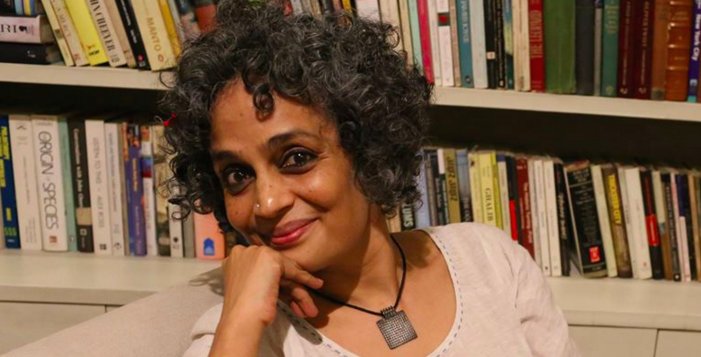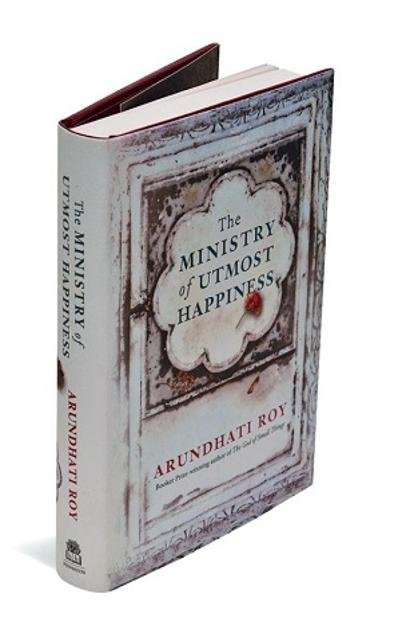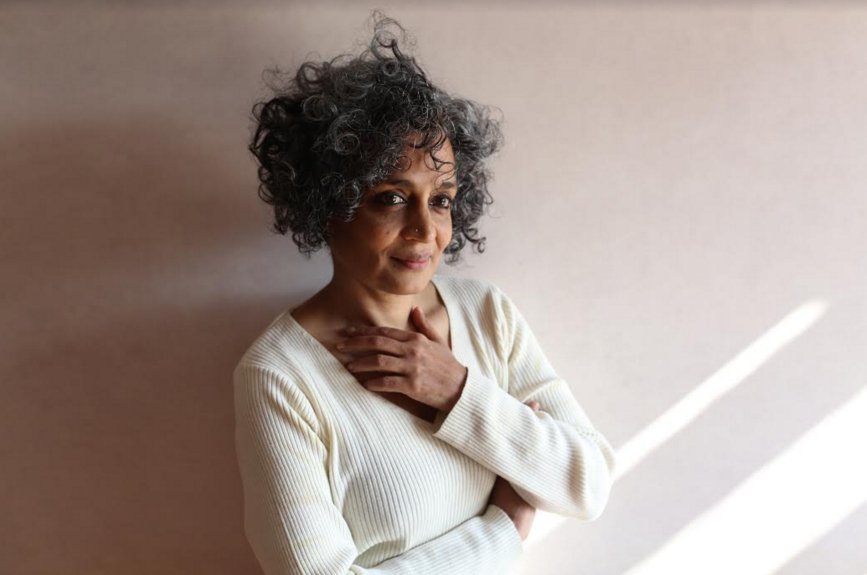In Ministry Of Utmost Happiness, Arundhati lines up icons of modern India like crows on wire (who just pry and conspire). Prime Ministers (past and present), anti-corruption leaders, social workers, no one is spared. The book, that has probably lived with India’s most talked-about writer for more than two decades, can easily be your guide to the many socio-political realities of 21st Century India. In his review, Jerry Pinto calls it “an important novel, an interesting one, seriously flawed yes, but ambitious in a way that will make many of us want to punish it and the author.”
Roy is no stranger to punishment. She lives in a nation where a section of people vocally talk about tying her to a bonnet of a jeep and using her as a human shield. She is the de-facto conscience-keeper of the country. She is also India’s favourite effigy to be burned.

Yet there is almost breathless excitement surrounding Arundhati Roy’s first novel after the subversive, game-changing debut, 1997’s God Of Small Things. Tantalising excerpts of the novel have revealed that the one of the main characters of the book is a free-spirited hijra, Anjum. She is a “clown without a circus, queen without a palace—she let the hurt blow through her branches like a breeze and used the music of her rustling leaves as balm to ease the pain.” When you ask her about Anjum, Roy is quick to point out that she is not a “stereotypical signifier” of the diverse community.
In an exclusive interview with ScoopWhoop news, Roy talks about her first novel in twenty years and reminds us how we are also a nation of “people who have brought the broken shards of their hearts together and are trying to create a mended heart”.
How did Anjum come to you? Clearly, she is a creation of exhausting research, can you tell us a bit about it?
The question of “research” has come up a lot around the character of Anjum. Quite honestly, I’m a little saddened by this question. Because it is never asked about other characters— for example nobody asks if I researched Men, or Intelligence officers in order to write the character of Biplab Dasgupta aka Garson Hobart. So there are two assumptions being made here— first that Anjum is a sort of stereotypical “signifier” of a whole, very diverse community of people who used to be called Hijras, and second, that she is different from other human beings and is outside the ambit of the human understanding, or empathy that has created all the other folks in the book and can only be constructed out of “research.” But she’s not a signifier—she’s she. Very particular. Very individual. Utterly unique.
Those who have read The God of Small Things and have appreciated the way you have played with language in it, will notice how this book is told almost like a fable. It’s starker. Do you agree?
Yes you’re right. The language is different. It’s a different book. And the language is particular to it. Also The Ministry contains many languages, many cadences—Hindi, Urdu, Sanskrit, Kashmiri, Malayalam, Telugu. I used to joke that I’d say “The Ministry of Utmost Happiness” translated from the original by Arundhati Roy.

In both GOST and Ministry… you tell stories of those in the fringes but you choose never to sentimentalise them. How do you strike the balance?
The God of Small Things is about a family with a broken heart. The Ministry is about people who have been ground down and driven out of the mainstream who bring the broken shards of their hearts together and try to create a mended heart. You cannot really attempt to create a balance in some external, artificial way. It’s instinct.
Ministry... will also be read by a generation of Indians who don’t know or don’t care about Emergency, Ayodhya or even Godhra. It will be subjected to relentless, half-baked scrutiny of right wing trolls. Were you conscious of that when you were writing this book?
Yes of course. If it is read, they will read about all that. And maybe they will care. Who knows? I don’t think my critics will come only from the right-wing. It won’t be that simple. And that’s as it always has been. And it’s fine and good.

Who is your favourite character from the book?
I cannot have a favourite. All of them have been lavished with attention—and don’t forget the animals, the vultures, the weevils, the crows, Payal the mare, the Gibbon from Borneo, the Nicaraguan Jaguar, the spotted owlet with exquisite manners. The Ministry is as much an animal book as it is a human book. And the animals wonder at humans who read it and don’t even notice them.
In a recent interview, you have said that what a Paresh Rawal or an Anupam Kher says about you doesn’t bother you because you know that there is still a large number of Indians who see the rationality in your arguments. That is reflected in your book, the hope that there is still hope. How do you still keep that burning in these tiring times?
Can you leave out this question? Because I haven’t said anything about them in any interview. I wouldn’t.
What advice will you give to a first-time Arundhati Roy reader?
I’m really terrible at giving advice.

















